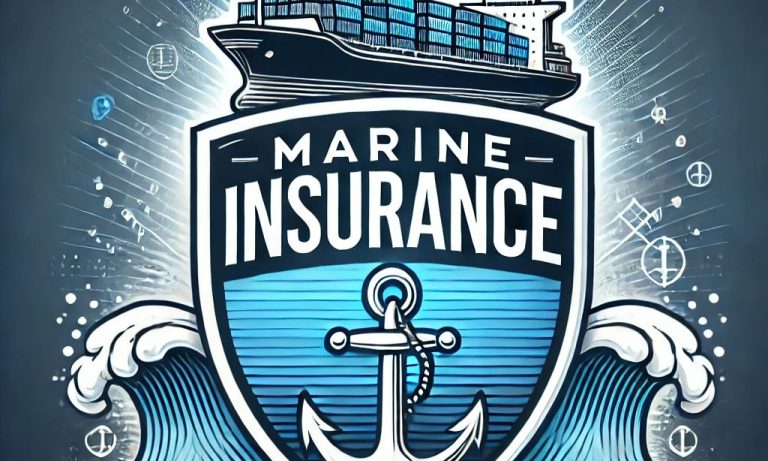Marine insurance is a specialized form of coverage designed to protect assets involved in maritime activities, including ships, cargo, and freight. Marine insurance can cover financial losses or damages in case of risks while goods are transported or the vessel is at sea. As a ship owner, cargo trader, or a logistics company, you may require marine insurance for covering financial risks involved with various types of dangers like accidents, theft, natural disasters, and piracy, among others. We will discuss in this article the different considerations under marine insurance, their benefits, types, and coverage.
What is Marine Insurance?
Marine insurance is a contract that offers protection against damages or losses that can occur to ships, cargo, and freight during transportation over water. It helps businesses and individuals involved in shipping and trade to safeguard their investments. The key purpose of marine insurance is to mitigate the financial impact of accidents, damages, or thefts that occur during transit or while the vessel is at sea. This type of insurance also extends to goods being transported, ensuring that any damage during the journey does not result in significant financial losses.
Marine insurance typically covers various types of incidents, such as sinking, collisions, piracy, and natural disasters like storms or floods. As the shipping industry is exposed to numerous unpredictable risks, having marine insurance becomes crucial for business continuity and security.
Example of Marine Insurance
An example of marine insurance can be seen when a shipping company insures its cargo while transporting goods across the ocean. If the ship encounters rough seas and the cargo is damaged, the marine insurance policy would cover the loss, compensating the company for the goods lost.
Benefits of Marine Insurance
Marine insurance offers several advantages to businesses, shipping companies, and individuals who rely on maritime transportation. Here are the primary benefits of marine insurance:
- Financial Protection Against Losses: The most obvious benefit of marine insurance is that it provides financial protection in case of an unfortunate event. Whether it’s cargo damage, theft, or shipwreck, marine insurance ensures that the policyholder is compensated for the loss, reducing the financial burden.
- Safeguards Business Continuity: For businesses that depend on maritime transportation for goods and raw materials, disruptions can lead to delays, lost revenue, and a damaged reputation. With marine insurance, businesses can resume their operations more quickly after a loss, minimizing the impact on their supply chain.
- Covers Multiple Risks: Marine insurance covers a wide range of risks, including cargo damage or theft, ship damage or sinking, piracy, natural disasters, and liability for injuries or damages caused by the vessel, ensuring financial protection during transit.
- Provides Global Coverage: Marine insurance typically offers worldwide coverage, making it suitable for businesses engaged in international trade. This is especially crucial for multinational companies that operate in different countries and regions, as they need protection across various maritime routes.
- Customizable Policies: Marine insurance policies are highly customizable, allowing businesses to tailor coverage to suit their specific needs. Whether you are shipping bulk goods or dealing with high-value cargo, the policy can be adjusted to provide adequate coverage for the risks you face.
Types of Marine Insurance
Marine insurance is not a one-size-fits-all product. It comes in various forms, each designed to protect different aspects of maritime activities. The main types of marine insurance include:
Hull Insurance
Hull insurance is specifically designed to protect ships and vessels. It covers damages to the ship itself, whether caused by collisions, sinking, or other incidents. This type of insurance is crucial for shipowners, as it helps repair or replace vessels if they are damaged during a voyage.
Cargo Insurance
Cargo insurance covers the goods being transported across the sea. This insurance ensures that if the cargo is lost, stolen, or damaged during transit, the owner receives compensation. Cargo insurance can be purchased for specific shipments or as a part of a broader shipping contract.
Freight Insurance
Freight insurance protects the financial interest in the shipment’s freight. It covers the risk that the goods may not be delivered on time or might get damaged. Freight insurance is often purchased by the carrier or the party responsible for delivering the goods to ensure that they do not suffer financial losses in case of any incident during transit.
Liability Insurance
Liability insurance protects the ship owner from legal liabilities if their vessel causes damage to other ships, property, or people. This can include accidents involving other ships, environmental damages, or even injuries to crew members and passengers.
War Risk Insurance
War risk insurance covers damages caused by acts of war or civil unrest. This is particularly useful in areas where piracy or military conflicts are common, as it protects against the risk of damage caused by warfare, terrorism, or hijacking.
Coverage of Marine Insurance
Marine insurance coverage varies depending on the type of policy purchased, but it generally includes the following:
- Damage or Loss of Vessel: If the vessel is damaged or lost during transit, marine insurance provides compensation for repairs or replacement. This coverage is essential for ship owners who rely on their vessels to transport goods across oceans.
- Cargo Loss or Damage: Cargo insurance covers the loss, theft, or damage to the goods being transported. It ensures that businesses or individuals involved in international trade do not face significant financial losses if goods are damaged or stolen during the journey.
- Liability for Third-Party Damages: Marine insurance policies also cover third-party liability, such as damages caused to another vessel or property. If a ship causes a collision or an oil spill, the shipowner will be protected from the financial fallout through liability coverage.
- Piracy and Hijacking: Piracy has been a significant concern in international shipping, especially in certain regions. Marine insurance often covers the risk of piracy, offering compensation for stolen cargo, damage to the vessel, or ransom costs if a ship is hijacked.
- Natural Disasters and Acts of God: Marine insurance policies often include protection against natural disasters like hurricanes, earthquakes, or floods, which can damage vessels, cargo, and other maritime assets. Such coverage ensures that losses from unpredictable events are mitigated.
- Collision, Grounding, and Sinking: A comprehensive marine insurance policy will cover damages caused by the ship colliding with other vessels, grounding (running aground), or sinking due to various reasons. This type of coverage is vital for shipowners who operate in risky waters.
Marine Insurance FAQs
What is an example of marine insurance?
An example of marine insurance is when a shipping company insures its cargo being transported across the ocean. If the cargo gets damaged or lost due to a storm, the insurance covers the financial loss.
What does marine insurance cover?
Marine insurance covers damage or loss to vessels, cargo, and freight during transportation, as well as liabilities for third-party damages, piracy, and natural disasters.
Why is marine insurance important?
Marine insurance is crucial because it protects businesses from financial losses caused by accidents, theft, natural disasters, or piracy during maritime transportation.
What types of marine insurance exist?
The types of marine insurance include hull insurance, cargo insurance, freight insurance, liability insurance, and war risk insurance.
Does marine insurance cover piracy?
Yes, marine insurance often covers the risk of piracy, providing compensation for stolen cargo or damages.


